Learning to live a more self sufficient-lifestyle no matter where you live has never been more desirable. These unprecedented times has many thinking about what positive steps they can take toward creating a more self-sufficient life. Taking control, changing your mindset, & learning a few basic skills will have you on the path to living more self- sufficiently.
This post may contain affiliate links at no additional cost to you. By making your purchases through the links on this website, IMSL may make a small percentage at no direct cost to you. IMSL only promotes products we use & truly believe in. Please refer to my Privacy & Disclosures for further information. IMSL thanks you for your support!
Becoming self-sufficient & living more independently from a consumer lifestyle does not mean you have to live on a 50 acre homestead. That would be a beautiful thing, but not realistic for many. It also doesn’t have to be all or nothing.
There is something to be said about relying on yourself for your families needs, especially during difficult times. That being said, there is no “one size fits all” approach to becoming more self-sufficient. By exploring your options, doing a little research & self-education, many of the following ways to become more self-sufficient can be embraced & put into practice no matter where you live.
WHAT IT MEANS TO BE SELF-SUFFICIENT
By definition, self-sufficient means…
“able to maintain oneself or itself without outside aid : capable of providing for one’s own needs”
Meriam Webster
Glorified visions of living on a homestead, lush green acreage with farm animals grazing lazily come to mind, is not what we are speaking of here. In our article, “Homesteading-What Is It?” we define our mission. It has always been to live more independently, drawing further away from becoming a producer & not a consumer. Never before have we been more thankful to our approach of living sustainably than right now.
“Self-sufficiency is probably the biggest reason why most choose to endeavor on the homesteading path. It certainly was for us. The need to know and teach our young daughter where our food comes from, how it was grown, and what it consists of. That a carrot doesn’t come from a plastic bag. The need to remove ourselves from the mindset of mass consumerism, knowing we can take care of ourselves no matter what.
IMSL
Self-sufficiency is also about creating the mindset of problem solving. Solving them without aid from others. Learning to fix a broken or leaking pipe. Learning to build something. Learning to sew on a button or repair a tear.
It’s not about living like it’s 1899, although I have been told I was born 100 years too late 🙂 It’s about learning to depend on yourself for you & your families needs.
IS IT POSSIBLE TO LIVE COMPLETELY SELF-SUFFICIENTLY
Is it possible to live truly self-sufficiently? Possible? Yes. Realistic? No. To be completely self-sufficient you would need to grow your own, make your own, bake your own, sell your own, & rely on your own. This is not something we’ve accomplished, and something that I believe very few have in todays modern world.
Just because you don’t have access to land to grow your own wheat does not mean a more self-sufficient lifestyle is out of reach for you. By incorporating a few of the suggestions below, you will be well on your way to becoming self-reliant & gain more independence.
Hopefully, the following suggestions of ways to become more self-sufficient no matter where you live will get the wheels turning & give you a few ideas of how you can become a “producer & not a consumer” anywhere.
49 WAYS TO BECOME MORE SELF-SUFFICIENT {NO MATTER WHERE YOU LIVE}
The following 49 suggestions are meant to inspire. Inspire you to live a bit more independently. Allowing you to live with a bit more confidence that you can rely on yourself & thrive. They may just turn you into a modern day “homesteader” yet 🙂
OLD-FASHIONED KITCHEN SKILLS
1. Learn To Cook From Scratch – You may need to purchase a few staples, but you will find that cooking from scratch will stretch your food dollars, taste better, and be healthier for you.
2. Have The Right Kitchen Tools – You may be saying, what? I have an outfitted kitchen that works just fine. You indeed may have, when there is power. Do you own a manual can opener? Or what about beaters? Having access to kitchen tools that require no additional power source (other than muscle) is something to think about. Our antique kitchen tools are some of my favorites. Look in antique stores, or estate sales. You will find tools that work & have been tested through time.
3. Learn Old-Fashioned Kitchen Skills – Can you make your own butter? Or what about cheese or yogurt? Or even how to roast a chicken? Knowing how to make your own can carry you through trying times when certain items may not be accessible.
4. Learn To Cook Over An Open Fire – Cooking over an open fire or even on a cook woodstove is an art. Trust me, we have had many a burnt offering in our cook woodstove oven 🙂
5. Learn To Can – The art of preserving food when in season by canning them prolongs the access to these wonderful foods…often by years. If you don’t already know how to can, this is one skill we highly recommend learning! We’ve got you covered in learning how!! Simply scroll to the right, subscribe to our site, and our gift to you FREE is a 10 page EBook delivered to your inbox.
6. Learn To Ferment Foods – Not only do fermented foods prolong shelf life of the food itself, there possibly may not be a healthier food to ingest! Fermenting food does not take expensive equipment & can be done anywhere. Be sure to check out my “The Craft Of Fermenting Food In A Mason Jar” for a complete tutorial on how you can ferment your own.
7. Create A Long-Term In-House Pantry – Stocking ahead with non-perishable items, think flour, grains, rice, pasta, & items you have canned or preserved will be put you a step ahead of those who don’t & help ease your mind come hard times.
8. Bake Bread – The staple of life, bread. Learning to cook your own from scratch is satisfying, delicious, and economical.
9. DIY Your Own Pantry Staples – Learn to make mayonnaise, mustard, salad dressings, marinades, & baking mixes. These will save money, reduce waste, & be healthier versions.
10. Dehydrate – Learning to dehydrate foods either grown yourself or purchased in bulk from your local grower will extend the shelf life of those foods. It’s easy to do & can be done no matter where you live.
GROW YOUR OWN & EAT LOCALLY
11. Learn To Garden – Growing what you eat & possibly turning that lawn into an edible one is most likely the one skill any self-sufficient person would recommend. Don’t have a lawn? Grow in pots, or use grow lights indoors. Don’t have special equipment? None needed to grow microgreens! Be sure to visit our “Growing Microgreens” article on how easy & fast it is! Don’t have a “green thumb”? None needed! Read through “Garden Failures – What To Do”. Where there is a will there is a way.
12. Eat Seasonally – Get in the mindset of eating what’s in season. It’s more nutritous, reduces carbon footprint, and typically is cheaper. Win, Win!
13. Become A Beekeeper – Keeping bees is an accessible skill anyone living anywhere can have access to. Even urban centers & city dwellers utilize space(s) available to them for keeping bees. Think rooftops & local community garden areas. Have your own backyard? Perfect! Get a hive or two. Begin your research with “15 Considerations To Beekeeping” to get you on your way.
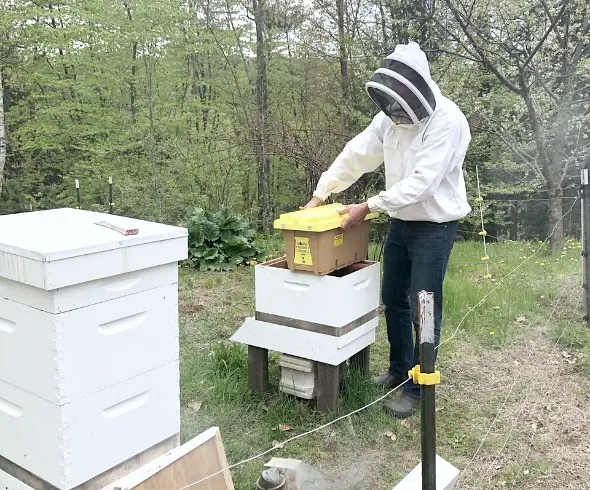
14. Compost – No matter where you live there are composting options. From countertop composting systems, to curbside pickups, composting is accessible to everyone, better for the environment, and provides food for the earth.
15. Vermicomposting – Create a vermicompost system. Easy, economical, and can be done anywhere.
16. Install A Rain Collection System – Gathering free resources such as water is a wonderful way to conserve, reduce groundwater demands, is good for the environment in that it can greatly reduce your ground erosion as well as storm water runoff, AND can reduce your water bills. Just sayin’ 🙂
17. Save Seeds – When you grow your own, learn how to save your own naturally produced seed. What a way to ensure you will have access to the type of seed you desire & have control over how that seed was produced & grown. And did I mention, will cut your food expenses? Who doesn’t like free food?
18. Join A CSA – CSA, standing for community supported agriculture, are typcially produce “shares” or boxes created by your local grower that are preodered by you, the consumer, and picked up or delivered on a set schedule. A great way to get locally grown, fresh produce, reduce carbon footprints, and promote healthy eating.
MAKE IT YOURSELF
19. Make Your Own Personal Care Products – Learn how to create & make your own products! We make our own moisturizers, deodorant, & toothpastes. Again, they work amazingly well, we can control what is in them, and they are cost effective.
20. Learn About Natural Remedies – Our environment, even those in the city may have access to green spaces that can harbor “weeds” of use in creating remedies, has all the resources necessary to create an amazing home apothocary. Elderberry, mullein, comfrey, st. johnswort, & plantain are just a few plants that grow wild & can be sustainably wild-crafted (gathered) and put to use. They’re free & readily found.
21. Make Candles – They are fun & economical to make, are healthier for you and your air quality when made with beeswax & natural scents. Utilize them occassionally in lieu of electrical lights. Your wallet will thank you.
22. Make Your Own Cleaners & Disinfectants – Making your own cleaners & disinfectants is cheap, we all have just about everything in our pantry’s already, healthier, reduces chemical loads, and works just as well if not better than most commercial cleansers.
23. Make Soap – This is one skill I have yet to give a go to, but on my list. Fun, easy, and you are in control of the ingredients.
24. Make Salves, Tinctures, & Remedies – Making your own is easy to do, fun, and work amazingly well. Think dandelion salve, elderberry syrup, elderberry tincture, & fire cider, are all must haves in any well stocked cabinet, in our humble opinion 🙂
25. DIY Your Own “Paper” Products – Make your own napkins, paper towels, and kitchen towels out of cloth. Many which can be made with no sewing experience.
26. DIY Your Own Dishcloths & Wipes – Learning to make your own dishcloths is easy. They last, are fast to make, & are economical to make.
27. Learn To Sew – Obviously, it’s not necessary to learn how to sew your own clothes (although would come in extremely handy if necessary). But learning the basics of how to repair a torn piece of clothing or sew on a button, or even quilt your own potholders, are skills easily acquired.
28. Learn To Knit Or Crochet – If you live in the tropics there is not much of a demand for hats & mittens. But many, myself included, live in colder climates. Learning to make warm clothing, everything from hats & mittens to blankets, scarves, and sweaters would be a skill worth learning.
BECOME A MINI-HOMESTEADER
28. Create A Cold Cellar – If you have the space/cellar, it’s easy to create a cold space to store all that you’ve grown or purchased when in season.
29. Consider Animal Husbandry – Keeping animals for what they can produce (milk, eggs, etc) is a great way to become more self-sustaining. Even in cities, keeping a few backyard chickens is becoming the norm. Not allowed in your neighborhood? Give rabbits a look (they grow fast, easy & economical to keep). Most ordinances have failed to list them in their rules.
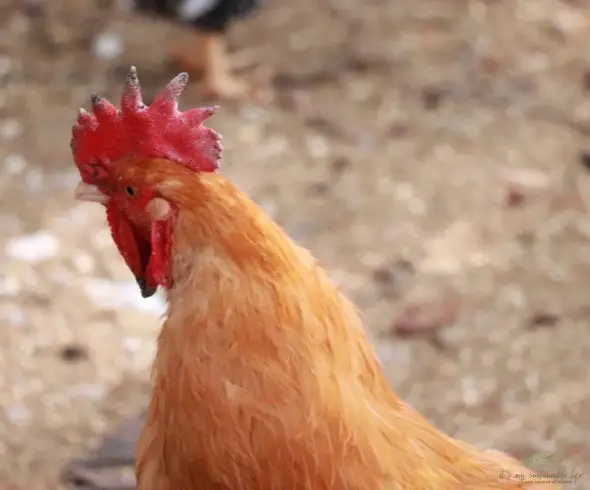
30. Learn To Hunt – This is a difficult one for many, myself included for some reason. Believe me, however, if it came down to eating or not, it could be accomplished. For those in the appropriate areas, this is a skill to have in your arsenal.
31. Learn To Butcher – If you are raising your animals for meat or hunting, learning to butcher your own ensures you know it’s your animal (many mix-ups have occurred when animals are brought to a 3rd party for butchering), how it’s processed, and stored.
32. Learn To Fish – If you have access to lakes, streams, or the ocean, you have access to locally caught fresh fish. Learning how to angle & catch them is the first step. Learning how to dress them out is the next.
33. Consider A Dairy Animal – If you have the space & land, consider a dairy cow or even a goat for milking. Having access to your own source of dairy opens a whole new world for creating cheese, yogurt, kefir, and a continued source of milk.
34. Learn To Live With Less – The homesteading mentally is first and foremost when learning to live sustainably. Learning to live sustainably naturally translates into living frugally. We grow our own, make our own, & use our own. You will find it’s easier than you may think.
35. Heat With Wood – There is nothing like heat coming from a woodstove or fireplace. It’s warmer. Why? No idea, just that it is. The benefits of heating with wood are plenty. It’s a sustainable resource, creates exercise & promotes a healthy lifestyle (it’s true that a cord of wood will heat you 3 times; cutting it, stacking it, & heating with it), its multi-purpose (heats our home & when our cookstove is running, cook on it), & creates self-sufficiency.
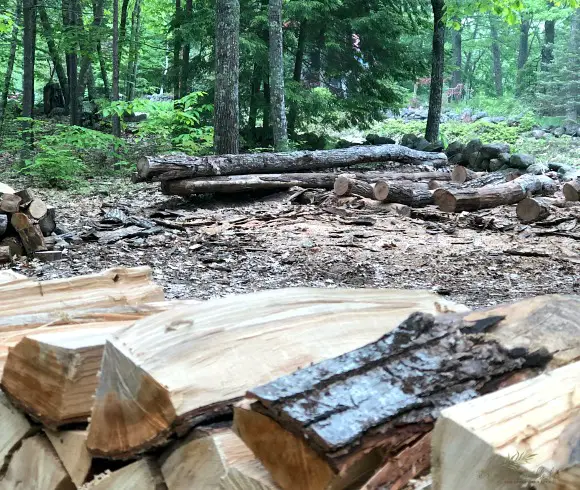
36. Generate Power – Our goal here at IMSL has always been to go off the grid & be completely independent. Our home was positioned such that solar power can easily be installed & utilized. Other power options other than solar? Consider wind (windmill), & hydro (small water turbine). Money allowing, we hope to install our solar at some point.
LEARN OLD-FASHIONED SKILLS
37. Forage – Foraging by definition is when a person searches “widely for food and provisions”. No matter where you live there are foraging opportunities. Parks, green spaces (please be sure there are no chemical treatments used), state parks, backyards, woods, and forests all offer edibles. Edible & medicinal plants are accessible & free.
38. Make A Fire – Learning to build a fire, both indoors as well as outdoors, with and without matches, is a life-saving skill everyone should know.
39. Hang Clothes To Dry – Our dependence on modern appliances is too often taken for granted. If you have the space (outdoor lines, racks on a balcony or indoors), using solar power to dry your clothes is sustainable, one of my favorite chores as it’s meditative, extend the life of your clothing, and smells so good when they are dried outside. Double points if you learn to wash your clothes by hand 🙂
40. Learn To Conserve – Waste not, want not is a mantra often spoken here on the hill. Learning to conserve, water, electricity, food, & supplies is a way of life here.
41. Create A Network – Our forefathers didn’t do it all themselves. They bartered, they created communities where skills could be exchanged, they borrowed instead of purchased. Creating your own network builds community, saves $$$, and who knows? You may build an arsenal of friendships along the way.
42. Create An Emergency Preparedness Kit – We don’t consider ourselves “preppers” by any means. But a little preparation in case of emergencies or unforeseen events can go a long way. Consider creating your own “kit”. Below are some suggestions you may wish to include.
- Water – Suggested amount is 1 gallon per day per person for as many days as you like. This is important especially when you rely completely on city & town water systems.
- Filtration System – In addition to water storage, you may wish to include a water filtration system.
- Batteries
- Flashlight
- Candles
- 1rst Aid Kit
- Whistle
- Sanitation & Cleaning Supplies
- Hand Crank Radio
- Solar Charger For Electronics & Phones
43. Learn Basic First Aid Skills – Knowing the basics of what to do in an emergency are skills everyone should know, and may be lifesaving. How to dress a wound, approach & handle a person in distress, and even perform CPR, are skills well worth taking the time to learn.
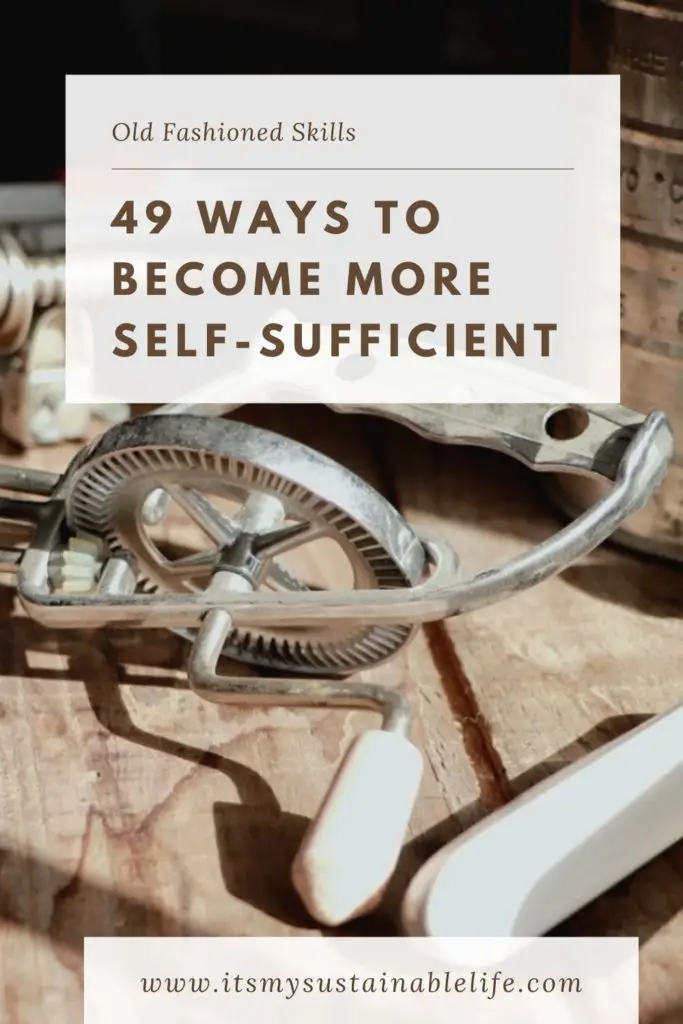
44. Exercise – Yes, you heard right. Incorporate exercise into your daily routine. Being physically & mentally prepared to live a more self-sufficient life is taxing. It’s physical work. It can be draining both physically & mentally. Be prepared. Exercise.
45. Learn Basic Auto & Engine Repair – Learning the basics of how to maintain your machinery, change a tire, or even change the oil, are well worth learning. Basic knowledge will save you time, money, & the aggravation of waiting for your next appointment.
46. Learn Basic Animal Care – If you plan on keeping animals, educating yourself on basic care, simple “veterinarian” skills such as de-worming procedures, is highly recommended for anyone raising & owning animals.
47. Practice Life Without Electricity – What would it look like should the power go down for an extended period. Would your toilets work? How would you keep your food from spoiling? Consider everything you rely on daily that utilizes electricity, consider alternatives, research & explore your alternatives.
48. Learn To Make Apple Cider Vinegar – Easy to make your own no matter where you live. Vinegar is useful in so many ways. Cleaning, disinfecting, medicinal, and using it in recipes are reasons we should all know how to make our own.
49. Read – Read an actual book. One you can hold & physically turn the page. Build up an in-house resource library on homesteading and old-fashioned skills. You’ll be prepared for any disaster should the internet go down or not be accessible. Self-education may be the most important skill to learn if you truly wish to become self-sufficient.
Learning to become self-sufficient will look different for everyone. Urban & city dwellers will obviously not be able to raise a dairy cow. However, canning what’s in season, growing a few choice vegetables, living frugally, foraging, & drying your clothes on a line can easily be accomplished.
As access to land increases (suburban to acreage) the opportunities for increasing your skill base increases as well. Learning to live more self-sufficiently doesn’t have to be an all or nothing choice. It’s a personal one. One that only you can determine how little or how much you want to incorporate into your life.
Let’s get the conversation going! What does living a self-sufficient lifestyle mean to you? What kind of skills or practices are you already practicing? Join me in the comments below, I love hearing from you!
Love, Light, & Laughter ~

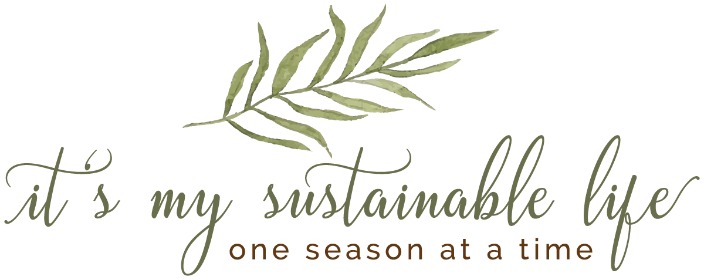

55 comments
A good list for making sure you’re not missing a big area in your life. I like that you mention auto and electrical, because those basic skills come in handy so much!
Thanks for sharing with us on the Homestead Blog Hop.
Great advice, and we all need to learn the boundary between need and want.😁
Such a great list! All of us can I corporate some, many or most of those into our lives, with amazing results!
Love this. I grew up with a garden(still have one), chickens, and a dad that hunted for meat. The makers movement is picking up speed as we become more self reliant.
All of these are excellent and I guess I didn’t really realize I’ve already been living that self-sufficient life this whole time.. guess that’s why during the time of panic mode I’m good and ready (so to speak) 😊 Thank you for sharing!
That’s wonderful! Brings such peace of mind when you are.
I love all of these tips and continue to master them! Your blog has such great ideas!
Thank you, Robin! I appreciate the read.
I’m impressed! I can’t do any of that stuff. Okay, I can cook from scratch, but i generally prefer not to. 🙂 I would like to be better at fixing stuff though.
Some very interesting things on your list, I have some extra time now to try some! Thanks for the ideas!
great ideas in our ever changing world! Thanks for sharing!
I wish all people would do some of these for themselves and their families!! I don’t do all of these. I don’t think I can by myself, but am definitely lead a more sustainable life than most of my friends.
This is the perfect time to start to learn to new skills like these! I have been cooking a lot more and we started our little garden.
I’ve got the time to learn right now – might give a few of these a try!
Two key things I would love to do is bake our own bread, we honestly don’t use it that often (except now in the current state) but freshly made bread just sounds like it would be sooo much better. And what a great skill to have. Second, eating seasonally, we love so many different foods but I honestly can say that I am only sure of a few items that are seasonal. I need to brush up on my knowledge for that and we will definitely start trying new foods!
Both of these are great skills to acquire! Keep your eye out for an upcoming article on baking bread. It’s easier than you think. Thanks so much for sharing & reading!
What does it say that I can/am/do all of these things except bees which is on my never ending list? Probably that I don’t have a storage shed full of toilet paper…
Hahaha, Pauline! I’m right there with ya’!
I am going to work on some of these! Thanks!
Wow what a great post. Love so many of the things that you list out. On my list for sure. Appreciate all the work in putting this together. Always enjoy your information.
In this day and age we have to live we really do need to become more self sufficient. It is interesting just how many things we can do on our own that I feel people just do not think about. Thank you for sharing.
Great list! This actually makes it seem less overwhelming than it normally sounds. I’m thankful my mom taught me how to garden, harvest, preserve, and cook from scratch at a young age. Sewing is another story, however. Haha
How blessed are you that you had a great teacher! We all have skills we need a little work with 🙂
Growing up in a third world country I learned to live a self sustainable lifestyle. But coming to the US, with all the tech and convenience, sadly I lost touch. It’s good to go back to your roots again, like fermenting your own food, growing your garden, even sewing are things taught to us in school that I’ve simply forgotten. It’s impossible for me to learn all that and more and own a farmland since I live in SoCal, but I #34 hit home for me. Live with less. Less is actually more. We have so much clutter at home it causes anxiety. So yes would start with living less.
What a privilege to grow up learning all those skills! You may be suprised at how many of the skillsets come back to memory when you use them once again. Thank you for reading & sharing. Good luck with your aspirations to living a bit more minimalistically.
SO many great tips here!! I am impressed! I have to say however, that I am quite partial to number 49 <3
Gotta say, I do enjoy a good story here and there myself! Thanks for reading, Hillari!
Wow, these are all amazing ideas. I already have a garden, compost and cook from scratch most of the time, but there are lots of things here I would love to try. Maybe learning to ferment will be next! Thanks for all the info!
Such a timely post! We all should become more self-sufficient now considering Coronavirus traveling around the world. It is so helpful not to depend on the stores and others to survive. Those are really great tips. Thank you for sharing, Suzan
Gorgeous post! LOVE LOVE LOVE! I think we can all be better humans if we learn to be a little more self sufficient
These are great ideas to make and create in your own home!
I love these tips. The one thing I have never mastered is canning – thanks for a great eBook!
So glad you grabbed the free copy! Let me know if you have any questions. Happy canning!
Lots of reasons right now to have these skills and pursue them if you don’t.
Wow that’s quite a list. Inspiring and overwhelming at the same time. Lol
One at a time. Thank you for reading, Debbie!
I love these ideas. I am especially interested in learning how to can and I will be creating my own emergency/safety kits soon.
Be sure to grab your FREE copy of the Ebook Canning For Beginners!
You listed so many great skills in your ways to homestead! So many of them we already do and kind of take for granted because we live in a rural area on 4+ acres on the water. I also read a few that I could consider doing/learning during this “down” time. Thank you – great info!
Wow I didn’t realize how many ways there are to be self-sufficient! Great post!
A lot of good information. I try to do what I can but resources are limited. I’d love to be able to grow my own food.
Some of these I want to click on and learn more! Like how to make Apple Cider Vinegar!
Keep your eye out for an upcoming post on just that, Judean!
I hope to learn most of these in order to live a simpler life in my retirement years. Always great tips from you! Shared on my business fb page 🙂
Thank you for the share & read, Jill!
Reading through the list I’m amazed at all the things we actually do without considering it to be Homesteading. My husband and I do it for the love of doing it and because it is things that we were taught to do growing up. Love the list!
There’s some great ideas for being self-sufficient. I miss being able to get fresh fruit and vegetables from dad & his garden.
Even before this epidemic, I thought that I should really have some more skills that don’t rely on other people. I am somewhat limited in what I can do outdoors since I live in the city, and I’ve never had a green thumb. Learning new “from scratch” recipes I can do! And I enjoy my dad’s honey from his bee hives.
Great lists and so important to learn them! Thanks for this and what a thoughtful post!
Yes yes yes we all need to become more self sufficient! Great list!!
Very timely for what is going on in the world today.
So I see there are lots of reasons I’m not more self-sufficient. 🙂 Maybe I’ll learn to do a few more of these things in this time of social-distancing. Thanks for curating this list for us, Suzan.
These are some really great ideas! Thank you so much for sharing with us at Encouraging Hearts and Home. Pinned.
Great post..I truly try to be more self-sufficient. But there is so much more I can learn! Thank you!
some of these things I know how to do but many I am still working on but in light of the fact that so much is going in the world I believe I will try my best to learn a bit more quicker